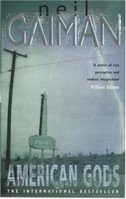Gaiman describes a contemporary America where all the gods, demons, and mythical beings that anyone in America has ever believed in are real, walking around looking like humans (at least, most of them, most of the time). It's mentioned several times that America is a bad place for gods-- all of the many peoples who came and settled here brought their faiths and beliefs with them, but most of them abandoned or forgot their old gods shortly after. And even the new gods don't last long, like the railroad god who was so powerful for a brief time. It's a disturbing book in a lot of ways-- not least because of the things that ring a little too true, like the god of TV that people worship by sacrificing time and sometimes relationships, or the car gods, with "their black gloves and on their chrome teeth: recipients of human sacrifice on a scale undreamed-of since the Aztecs."
The main story follows Shadow, an ex-con who finishes serving his time in prison and gets out only to discover that his wife was just killed in a car accident. Since he has nothing else to do, he decides to take the job offered him by a strange personage who calls himself Wednesday. Shadow travels with Wednesday as they try to recruit some the old gods for a war that is coming, a huge storm-- or a paradigm shift. Of course, all is rarely as it seems. As Shadow says at one point, "you play your cards so close to your chest that I'm not even sure that they're really cards at all." Interspersed with this story are many smaller tales of the various peoples who came to America and the gods they brought with them.
Part of the genius of Gaiman's story is the way it rings true-- including the way the names of gods and pagan rituals have become part of our language, although most people don't realize it. Shadow eventually discovers that Wednesday is the Norse god Odin, and his modern name is completely apropos because the word is derived from a variation of Odin's name, Wotan. At another point, they meet a goddess of fertility who calls herself Easter (Odin calls her Eostre), and claims that people still worship her, but Odin proves her wrong by asking a few people at random what the Easter holiday is about-- and they know practically nothing about it.
The book does contain a three fairly explicit sexual encounters, two of which I found quite disturbing. One of them came quite early in the book, and it bothered me so much I had trouble wanting to pick up the book again to keep reading (I got the point metaphorically-- a guy is worshipping sex and is literally swallowed up by it-- but still thought it was very disturbing).
American Gods is an interesting book which offers plenty to think about. Many times I found myself noticing the great turns of phrase in Gaiman's language. Here's one passage that demonstrates that as well as his tone and some of the underlying ideas in this book.
None of this can actually be happening. If it makes you more comfortable, you could ismply think of it as metaphor. Religions are, by definition, metaphors, after all: God is a dream, a hope, a woman, an ironist, a father, a city, a house of many rooms, a watchmaker who left his prize chronometer in the desert, someone who loves you-- even, perhaps, against all evidence, a celestial being whose only interest is to make sure your football team, army, business, or marriage thrives, prospers, and triumphs over all opposition.
Religions are places to stand and look and act, vantage points from which to view the world.
So none of this is happening. Such things could not occur. Never a word of it is literally true. Even so, the next thing that happened, happened like this...
| Title: | American Gods |
|---|---|
| Author: | Neil Gaiman |
| Date published: | 2001 |
| Genre: | Fantasy |
| Number of pages: | 465 |



0 comments:
Post a Comment